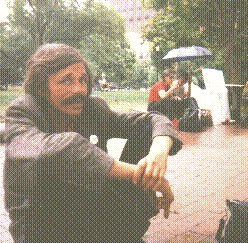Proposition One

ARTICLE V, U.S. CONSTITUTION:
the Article of Change
[Second of three papers by
Joseph Vigorito]
Article V spells out the procedure for amending the Constitution.
Amendment was designed to be difficult. The founding fathers,
believing that the Constitution should not be subject to whims of
popular beliefs, designed a system that has withstood the test of
time. Were it not for this "difficulty," simple majorities might
have run roughshod over protected freedoms and rights.
Text of Article V
- "Ths Congress, whenever two thirds of both Houses shall
deem it necessary, shall propose Amendments to this
Constitution, or, on the Application of the Legislatures
of two thirds of the several States, shall call a
Convention for proposing Amendments, which, in either
Case, shall be valid to all Intents and Purposes, as part
of this Constitution, when ratified by the Legislatures
of three fourths of the several States, or by Conventions
in three fourths thereof, as the one or the other Mode of
Ratification may be proposed by the Congress....; and
that no State, without its Consent, shall be deprived of
its equal Suffrage in the Senate."
History of Article V
Article V is the point where social change meets legal procedure
to form law, and thereby implement that social change. Some of
the most fundamental changes in American history have vented
through this Article.
Issues such as the right of a woman to vote and the right not to
be enslaved are changes so basic and all-encompassing that only
an amendment to the basic law of the land would suffice. Indeed,
it is the Article of change.
One of the most interesting stories of this Article is that of
the 21st Amendment which, ratified on December 5, 1933, repealed
the 18th (Prohibition) Amendment of 1919. Much of the mandate
for FDR's New Deal came from voters empowered by this, the first
successful initiative to amend the Constitution. In the process,
Franklin Delano Roosevelt and the Democrats swept into the
Presidency.
On December 5, 1932, the 76th Congress reconvened for the first
time after the November 1932 general election. The gallery was
raucus. The speaker had to suspend argument a number of times
throughout the day to quiet what was more atune to a party than a
legislative session.
There was a sense of urgency in the House that day. Years before
the Republican party had created the 18th Amendment, which made
alcohol illegal. In 1932 the people in all the states with
initiative procedures had placed on their ballots a measure to
repeal the 18th Amendment. The Republicans, President Hoover's
party, in their platform had held their position to keep
Prohibition.
Immediately after the opening prayer, under a "motion to suspend
the rules of the House," with no committee hearings and limiting
all debate to 20 minutes for the "wets," 20 minutes for the
"dries," they voted 287-117 for the 21st Amendment. Within a
matter of days a House/Senate joint resolution was passed to
order the Constitutional Convention in the states to begin.
Thirty-six million people voted on the initiative. Twenty-six
million voted to overturn the 18th Amendment. As the Democratic
platform endorsed the 21st Amendment (repeal), half of the House
and almost a third of the Senate was turned out of office around
the issue. The President was soundly defeated.
The 21st Amendment was the only amendment to the Constitution
which was ratified by convention.

